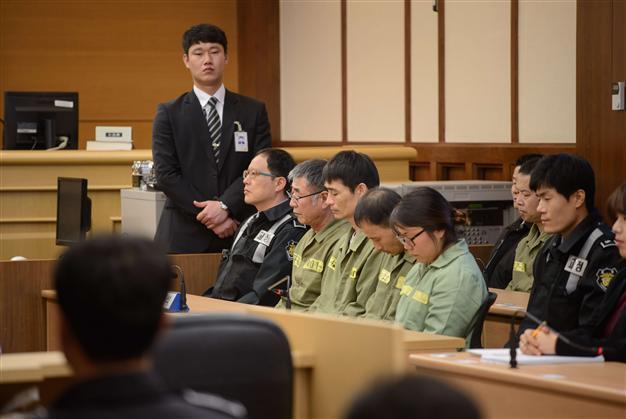Korea ferry captain jailed for 36 years, acquitted of murder
GWANGJU, South Korea - Agence France-Presse

Sewol ferry captain Lee Jun-Seok (3rd R) sits with other crew members inside a a court room in Gwangju at the start of the verdict proceedings on November 11, 2014. AFP Photo
The captain of the South Korean ferry that sank in April with the loss of more than 300 lives was jailed for 36 years Nov. 11, but acquitted of murdering those who died in the disaster.In a ruling that followed five months of dramatic, often painful testimony, a three-judge court said prosecutors, who had demanded the death penalty, failed to prove Captain Lee Jun-Seok, 69, had acted with an intention to kill.
However, he was convicted of gross negligence and dereliction of duty, including abandoning his vessel while hundreds of passengers -- most of them schoolchildren -- remained trapped on board.
Victims' relatives who were present in the courtroom in the southern city of Gwangju, reacted furiously to the murder acquittal.
"Where is the justice?" one woman shouted at the judges, while others wept openly.
"It's not fair. What about the lives of our children? They (the defendants) deserve worse than death," screamed another.
Three other senior crew members, who had also faced homicide charges, were sentenced to jail terms of between 15 and 30 years.
"We find it hard to conclude that the defendants ... were aware that all of the victims would die because of their actions and they had an intention to kill them," Judge Lim Joung-Youb said in announcing the verdict.
"Therefore the murder charges are not accepted."
However, Lim stressed that had Lee and his crew acted properly as soon as the Sewol ran into trouble, then many lives might have been saved.
Lee and his crew were vilified in the wake of the April 16 disaster and, with emotions running sky high across the country over the loss of so many young lives, some legal experts had raised doubts over whether they would receive a fair trial.
South Korean media coverage of their arrest and arraignment was often coloured by a presumption of guilt. Before the trial even began President Park Geun-Hye publicly stated that the crew's actions had been "tantamount to murder".
As well as abandoning the ship, Lee and his crew were condemned for instructing passengers to remain where they were as the vessel began to list dangerously.
When the trial wrapped up late last month, Lee acknowledged that he had been paralysed by panic and failed to take "appropriate measures" that could have saved lives.
But he always strenuously denied having knowingly intended to sacrifice the lives of the passengers.
The 6,825-tonne Sewol was carrying 476 people on board when it capsized. Of the 304 who died, 250 were students from the same high school.
Just hours before the court gave its ruling, Maritime Minister Lee Ju-Young announced the end of the near seven-month search of the sunken vessel for missing bodies.
"The situation within the ship has become too difficult to continue," Lee said, citing the collapsing interior and worsening sea conditions with the onset of winter.
Two divers died in May during search efforts in an area known for rapid currents and poor underwater visibility.
With nine victims still unaccounted for, and warnings that they may have been washed out to sea, Lee said he "deeply regretted" that some families would be left with no body to mourn.
The minister did not elaborate on when or whether the government plans to pull the ship out of water, saying the decision would be made after discussions with experts.
The relatives of the missing issued a statement backing the decision and thanking the "heroes" on the recovery teams for their efforts.
"We have endured these painful times with the hope that we will, someday, be able to hold in our arms and cry over the bodies of our loved ones," a tearful family member said, reading out the statement.
"But what's most important is the safety of divers... and we want the search operation to stop," she said, adding that the decision had been a "heartbreaking" one to make.
The Sewol disaster stunned the entire country and raised fraught questions about what Asia's fourth-largest economy had sacrificed in its rush to development.
Grief swiftly turned to anger as it became clear that the tragedy was almost entirely man-made -- the result of an illegal redesign, an overloaded cargo bay, an inexperienced crew and an unhealthy nexus between operators and state regulators.
















